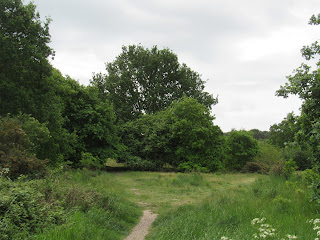Friday, 21 June 2019
EGG THIEVES BLAMED FOR ' DEVASTATING' RAID ON NORFOLK LITTLE TERN COLONY
The RSPB is assisting Norfolk Constabulary in an investigation surrounding the suspected theft this week of little tern eggs from Winterton beach in North Norfolk.
In the early hours of the morning of Thursday 20 June 20, RSPB little tern wardens discovered that up to 20 eggs had been illegally stolen from 7 clutches.
Human footprints were identified leading up to each nest.
Little terns are one of the UK’s rarest breeding seabirds, having suffered serious declines over the past 25 years.
In the 1980s there were 2,500 breeding pairs. This fell to fewer than 2,000 pairs in 2000, and it is now estimated that there are currently 1,500 pairs or fewer.
Fabian Harrison, of the RSPB, says: “With over half of the UK’s breeding little terns making a home in East Anglia this year, this is devastating.
"It is upsetting to see the hard work of these birds go to waste, as they will now have to re-lay and attempt to rear their chicks before the summer is over.
"We implore the public to stay vigilant and to report any suspicious behaviour to the Police immediately.”
Norfolk police are appealing for information from anybody who witnessed anything suspicious between 6 pm on Wednesday June 19 June and 7.30 am on Thursday June 20 , on or near Winterton beach.
Photo: Courtesy RSPB.
Tuesday, 18 June 2019
FAILURE OF PEREGRINE NEST ATTRIBUTED TO 'INEXPERIENCE' OF FEMALE PARENT
ALL five peregrine chicks hatched in their nest in a Lincolnshire church have died.
The nesting peregrines were a tourist attraction at St James' Church in Louth - their activities being screened via webcam to the coffee shop.
Only two per cent of nesting peregrines lay as many as five eggs, so this year's tally was a record for the county.
The nest was being monitored by Geoff Mullett who has written a booklet on Louth's peregrines.
He told the Lincolnshire Bird Club's website: " The last surviving chick was picked up near the church, presumably having been dropped there by the adult female.
"It is thought the adult female was an inexperienced bird.
"This was probably her first clutch of eggs, and she just was not able to brood and feed the chicks sufficiently.
"The recent wet weather didn't help.
There is a website dedicated to the Louth peregrines at
www.louthperegrines.org.uk/news.html
The nesting peregrines were a tourist attraction at St James' Church in Louth - their activities being screened via webcam to the coffee shop.
Only two per cent of nesting peregrines lay as many as five eggs, so this year's tally was a record for the county.
The nest was being monitored by Geoff Mullett who has written a booklet on Louth's peregrines.
He told the Lincolnshire Bird Club's website: " The last surviving chick was picked up near the church, presumably having been dropped there by the adult female.
"It is thought the adult female was an inexperienced bird.
"This was probably her first clutch of eggs, and she just was not able to brood and feed the chicks sufficiently.
"The recent wet weather didn't help.
There is a website dedicated to the Louth peregrines at
www.louthperegrines.org.uk/news.html
Friday, 7 June 2019
SIXTY-MINUTE TWITCH: NORFOLK COASTAL FOOTPATH, WELLS-NEXT-THE-SEA
Location: Norfolk Coastal Footpath,
Wells-next-the-Sea (towards Stiffkey)
Date: June 2, 2019
Time: 6pm
Weather: Hazy sunshine, humid
Target species: Black-winged stilt
Star species
seen: Garden warbler
Other species recorded: Red kite,
marsh harrier, little tern, sandwich tern, common tern, redshank,
oystercatcher, avocet, woodpigeon, collared dove, whitethroat, swift, blue tit,
great tit, mallard, shelduck, carrion crow, magpie, jackdaw, house sparrow,
swallow, housemartin, cuckoo, reed bunting, reed warbler, Cetti's warbler,
herring gull, lesser black-backed gull, black-headed gull.
Wednesday, 5 June 2019
THIRTY-MINUTE TWITCH: SYDLESTONE COMMON, NORTH NORFOLK
Location: Sydlestone Common, Sydlestone, North Norfolk (Norfolk Wildlife Trust reserve)
Date: June 4, 2019
Time: 11.45am
Weather: Hazy sunshine, hardly any breeze
Target species: Woodlark/ red-backed shrike/ whinchat/ tree pipit
Star species seen: Not awarded
Actual species seen: Chaffinch, bullfinch, linnet, goldfinch, yellowhammer, skylark, swallow, great tit, blue tit, pheasant, willow warbler, chiffchaff, blackcap, whitethroat, blue tit, buzzard, carrion crow, magpie, wren, robin.
Target species: Woodlark/ red-backed shrike/ whinchat/ tree pipit
Star species seen: Not awarded
Actual species seen: Chaffinch, bullfinch, linnet, goldfinch, yellowhammer, skylark, swallow, great tit, blue tit, pheasant, willow warbler, chiffchaff, blackcap, whitethroat, blue tit, buzzard, carrion crow, magpie, wren, robin.
Subscribe to:
Comments (Atom)

















